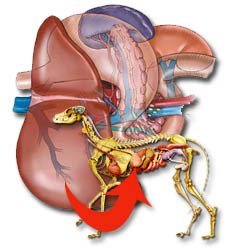 The liver is an extremely important organ because it is the primary filter used to process toxins as they pass through to the intestines. The liver prepares the toxins and other waste substances for elimination by the kidneys. In addition, the liver also manufactures blood proteins, proteins needed for clotting, blood sugars, and bile. This organ plays a major role in metabolism, detoxification, energy storage, and nutrient absorption.
The liver is an extremely important organ because it is the primary filter used to process toxins as they pass through to the intestines. The liver prepares the toxins and other waste substances for elimination by the kidneys. In addition, the liver also manufactures blood proteins, proteins needed for clotting, blood sugars, and bile. This organ plays a major role in metabolism, detoxification, energy storage, and nutrient absorption.
Hepatitis, cirrhosis, jaundice, and hepatic lipidosis are all forms of liver disease which can impede the liver’s function to a life threatening point. Hepatitis, literally, is inflammation of the liver but the name is often used for viral infections such as Infectious Canine Hepatitis of Dogs (ICH or CAV-1 because it’s an adenovirus), Chronic active hepatitis (CAH or Chronic Canine Inflammatory Hepatic Disease) which can occur in both dogs and cats, and copper-associated chronic hepatitis (CACH).
Cirrhosis is when normal liver tissue is replaced with scar tissue because of continuous liver inflammation and cell degeneration. Jaundice is a yellowing of the eyes, skin, and mucous membranes caused by a number of diseases, but most commonly hepatitis. 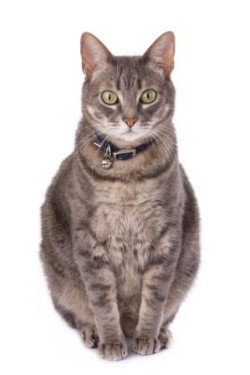 And hepatic lipidosis mainly occurs in overweight cats. The cat stops eating for any number of reasons which forces the liver to convert body fat into usable energy. If this happens for an extended period of time, fat triglycerides build up in the liver, impeding its function.
And hepatic lipidosis mainly occurs in overweight cats. The cat stops eating for any number of reasons which forces the liver to convert body fat into usable energy. If this happens for an extended period of time, fat triglycerides build up in the liver, impeding its function.
Some of these conditions are more easily treated than others. In years past, a diagnosis of liver disease was thought to be a death sentence by conventional veterinarians. Nowadays, so many pets have been cured using holistic medicinal practices that even some allopathic veterinarians are beginning to admit that liver disease can be curable and that certain holistic methods have merit. After all, holistic simply means taking into account the whole of a given system instead of focusing on individual parts or symptoms.
Liver problems are difficult to detect early on because the initial symptoms don’t seem alarming and are common to a number of ailments.
These initial symptoms include:
 Vomiting
Vomiting- Loss of appetite
- Weight loss
- Soft or gray stools
- Listlessness
- Weakness
As the liver is left untreated and becomes more damaged, symptoms progress to:
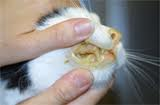 Jaundice
Jaundice- Convulsions
- Confusion
- Fluid retention causing a bloated abdomen
Liver disease can be caused by a number of things such as viral and bacterial infections or an overload of toxins in the system, which is why a natural diet is important for prevention. Other important preventatives include avoiding:
- Nonsteroidal anti-inflammatory drugs such as aspirin, Rimadyl, Teogesic or Feldene
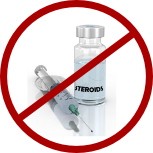 Cortisone compounds, steroids
Cortisone compounds, steroids- Heavy metals such as mercury from some deep-sea fish and lead from paint chips
- Phenobarbital (See Epilepsy and Seizures)
If you suspect your pet has a liver problem, see a holistic veterinarian right away. The sooner liver disease is caught, the easier it is to treat. Although it’s imperative that you seek professional care, the following are often recommended as treatments for liver disease.
Herbal and Naturopathic Help
Taking the strain off of the liver is of primary importance when beginning treatment. Most holistic veterinarians recommend a fast to start, especially if your pet has a fever. Depending on your pet’s condition, small and easily digestible meals fed throughout the day may be called for. But if your pet is in the early stages of liver inflammation, a fast is advised. There is a method to fasting your pet, though, so see the section on fasting for more information.
 Make sure your pet is on a natural, raw meat diet made from organic, quality ingredients. Give extra doses of vitamin C for hepatic conditions, 500 to 2,000 mg four times a day is recommended, depending on your pet’s size. Glandular supplements are also advised, not only liver glandulars, but thymus, as well. Also give beta carotene and a multi-vita-mineral supplement. Beta carotene is a carotenoid that’s found in red, yellow, and orange vegetables, and also in leafy greens. Supplement your pet’s diet with digestive enzymes and probiotics.
Make sure your pet is on a natural, raw meat diet made from organic, quality ingredients. Give extra doses of vitamin C for hepatic conditions, 500 to 2,000 mg four times a day is recommended, depending on your pet’s size. Glandular supplements are also advised, not only liver glandulars, but thymus, as well. Also give beta carotene and a multi-vita-mineral supplement. Beta carotene is a carotenoid that’s found in red, yellow, and orange vegetables, and also in leafy greens. Supplement your pet’s diet with digestive enzymes and probiotics.
A little bit of apple cider vinegar can also be added to your dog or cat’s meal. Apple cider vinegar has been said to help with allergies, arthritis, and other conditions. It’s a source of vitamins, minerals, amino acids, and enzymes, and it helps keep your pet’s pH in check. It’s also said to help prevent cancer and it has anti-bacterial and anti-fungal properties.
 Milk thistle is one of the best all-around liver herbs. Aloe vera juice, chaparral, and Essiac tea are other remedies that have been used for cancer and liver disease. Whatever treatment plan you decide on, milk thistle should be included.
Milk thistle is one of the best all-around liver herbs. Aloe vera juice, chaparral, and Essiac tea are other remedies that have been used for cancer and liver disease. Whatever treatment plan you decide on, milk thistle should be included.
Hsiao Chai Hu Tang is also known in China as xiao chai hu tang, in Japan as Sho-saiko-to, and in the west as Minor Bupleurum. The “bupleurum” comes from its main ingredient, Hare’s Ear Root, otherwise known as Bupleuri chinense. 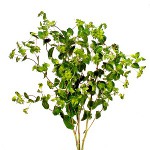 Hsiao chai hu tang is also comprised of skullcap root, ginger root, Half summer, jujube fruit, ginseng root, and licorice root. In a 1995 edition of Alternatives, Dr. David Williams stated that hsiao chai hu tang may be the “best medicine available in the treatment of primary liver cancer.” It’s also known to be beneficial in all types of liver disease. Hsiao chai hu tang is sometimes alternated with milk thistle as a therapeutic regimen.
Hsiao chai hu tang is also comprised of skullcap root, ginger root, Half summer, jujube fruit, ginseng root, and licorice root. In a 1995 edition of Alternatives, Dr. David Williams stated that hsiao chai hu tang may be the “best medicine available in the treatment of primary liver cancer.” It’s also known to be beneficial in all types of liver disease. Hsiao chai hu tang is sometimes alternated with milk thistle as a therapeutic regimen.
There are many more herbs that have been noted as promoting liver health. All of the blood-cleansing herbs and detoxifiers are helpful. Here’s a list of a few good ones:
Blood-cleansers
 Burdock root
Burdock root- Dandelion root and leaves
- Red clover
- Oregon grape root
- Stinging nettle
- Yellow dock root
- Sheep sorrel
Detoxifiers and nutrient suppliers
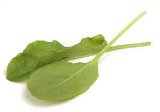 Wheat grass
Wheat grass- Rye grass
- Barley grass
- Alfalfa
- Spirulina
- Chlorella
- Sheep sorrel
Most holistic veterinarians also believe acupuncture to be very helpful with liver disease.
Homeopathy
It’s imperative that you consult a veterinary homeopath before starting any homeopathic treatment for liver problems. Nux vomica is a basic detoxifier often 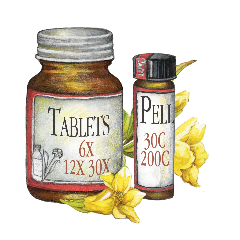 used for pets with liver disease.
used for pets with liver disease.
During the initial stage of fever, dilated pupils, and restlessness, give one or two tablets of Belladonna 30c every four hours for a total of three treatments. Allow no food fifteen minutes before or after treatment.
There are other homeopathic remedies, but they are very particular to each pet’s situation and stage of illness.